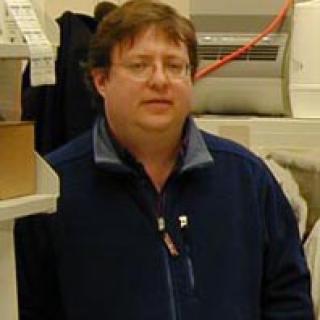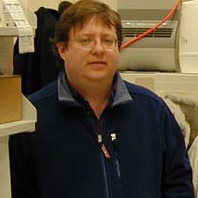
Thomas R. Bauer Jr., Ph.D.
- Center for Cancer Research
- National Cancer Institute
- Building 10-CRC, Room 3-3264
- Bethesda, MD 20892-1203
- 240-858-3644
- bauert@mail.nih.gov
RESEARCH SUMMARY
Dr. Bauer has been working for more than a decade towards gene therapy to treat a childhood immunodeficiency disease known as leukocyte adhesion deficiency (LAD). Patients with LAD have defects in their leukocyte integrin CD18 gene, which leads to defective leukocytes that are unable to adhere to and migrate to sites of bacterial infection. In dogs that have canine leukocyte adhesion deficiency (CLAD), Dr. Bauer and his colleagues have shown that by using gene transfer of the canine CD18, they are able to correct the CD18 defect in canine leukocytes, both in vitro and in vivo, leading to dogs that are free of their CLAD disease.
Areas of Expertise

Thomas R. Bauer Jr., Ph.D.
Research
For over a decade, our lab has been working towards gene therapy of the childhood immunodeficiency disease "Leukocyte Adhesion Deficiency", also known as LAD. Patients with LAD have defects in their leukocyte integrin CD18 gene, which leads to defective leukocytes unable to adhere to and migrate to sites of bacterial infection. Although hematopoietic stem cell transplantation can cure LAD patients, too few patients have suitable transplantation donors. We have investigated the possibility of transferring a functional copy of the CD18 gene into patients' hematopoietic stem cells using gene transfer with retroviral vectors.
Towards this end, we have used an animal model of LAD in dogs, known as "Canine Leukocyte Adhesion Deficiency" or CLAD, to investigate the various vectors and conditions required for successful gene transfer. We have shown that by using gene transfer of the canine CD18, we are able to correct the CD18 defect in canine leukocytes, both in vitro and in vivo, leading to dogs that are free of their CLAD disease.
Publications
Long-term follow-up of foamy viral vector-mediated gene therapy for canine leukocyte adhesion deficiency
Leukocyte integrin activation mediates transient neutropenia after G-CSF administration
Gene therapy for canine leukocyte adhesion deficiency with lentiviral vectors using the murine stem cell virus and human phosphoglycerate kinase promoters
Treatment of canine leukocyte adhesion deficiency by foamy virus vectors expressing CD18 from a PGK promoter
Gene therapy of canine leukocyte adhesion deficiency using lentiviral vectors with human CD11b and CD18 promoters driving canine CD18 expression
Biography

Thomas R. Bauer Jr., Ph.D.
Born in Southwestern PA, but raised during my formative years in the suburbs of Los Angeles, I left SoCal for Indiana, where I received a B.S. in microbiology from the University of Notre Dame in 1985. Desiring warmer weather, I went to the University of Miami (Florida), where I received a Ph.D. in microbiology and immunology in 1992 studying human immunoglobulin lambda light chain genes. From there, I joined the laboratory of Dennis Hickstein in Seattle, where I was a postdoc and later acting instructor, working on LAD and CD18, and to my current position as staff scientist at the NCI.